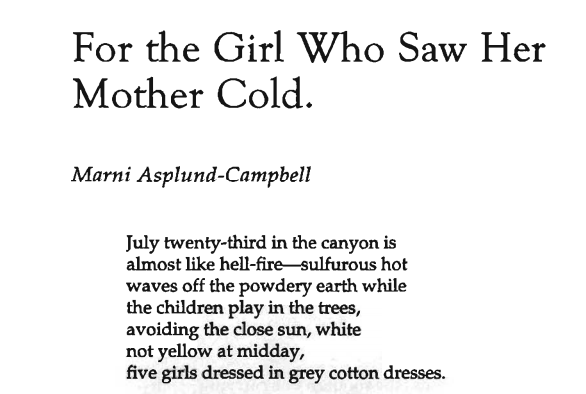Articles/Essays – Volume 27, No. 2
For the Girl Who Saw Her Mother Cold
July twenty-third in the canyon is
almost like hell-fire—sulfurous hot
waves off the powdery earth while
the children play in the trees,
avoiding the close sun, white
not yellow at midday,
five girls dressed in grey cotton dresses.
They find small, shining rocks, juniper
berries, and a few star flowers,
growing in a clump by some wet moss
in the trees, and
carry them in the wide folds of their skirts,
to make a house in the trees with
the flowers, berries, and the rocks.
Their hair is twisted around rags
into hard knots on their heads—they
will have long, springing curls for
Pioneer Day, and so the rags must stay in
one more night.
Family will be coming tomorrow, twelve miles
up the canyon from Cedar City, for a party,
to get away from the dust and crowds.
New children, new games, and
their father is bringing ice from the city
which he will pack around the silver tub filled with
milk, eggs, sugar. The girls know how it will
be, and how their father will offer the largest
helping to the child who eats, in a single bite,
a huge spoonful, the first, just hardened,
creamy white, with rim of salt along the edge of the spoon.
And one child will take the bite, stagger off,
temples throbbing, to grown-up laughter.
Kathryn walks to Crystal Stream, and stops,
midway, to spread her fingers around her ribcage
to contain the boisterous movement of her
heart and breath, and the babies that
roll inside her nearly every minute now.
Her husband has blessed her, she so far up the canyon,
told her that she is carrying boys, welcome after
the five daughters.
Her hair is tied up, against the heat, and she
listens as she walks for the hum of her girls
in conversation
in the trees.
She hitches the two pails (she shouldn’t be carrying
water, but Lord knows who
will)
and walks on to the stream, slowly, the babies
sending shots of pain down through her thighs.
She bends and lifts the pail, full, from the stream
and stops, again, to feel the babies, and then
she hears
the clear laughter
of her daughters, and then
another sound,
tighter, sharper, a waiting
sound, she waits, and
the air
splits
and she
is split by
a blade of light,
lightning
from the empty sky.
For a moment she is filled,
glorious,
fibers, fluids, toned and
perfected, purified
in the twinkling
of an eye,
then she falls, where her husband will see her later,
her fingers combing the Crystal Stream water,
her mouth still, belly heaving with labor.
Family comes, and she is still laboring, “hit by lightning,”
her husband says, “out of the blue.” He shakes his head,
presses his thumbs to his temples, and the women set to
work.
Scrubbing a linen sheet in the stream,
they lay it out to dry in the sun,
to whiten and stiffen it for sewing
in the evening. They know how these things
go
The midwife sends the children to the trees. There are no screams,
but there is a dying smell, and at first Kathryn speaks,
her voice throbbing with the energy and the pain.
“Keep the oldest girls please, and send the little ones
to mother. They’re too much for you, on your
own,” she says, slowly, slowly easing into the pain,
the rhythm, the beating, beating.
Children sleep in the tents, aunts and uncles hover
in the back bedroom, blessing and praying, but she is so, so
tired. Let me go. Let me go. God. God. My God.
She is split again, this time released
from the charred body, beaten, ecstatic
she rips apart to deliver a tiny, silver boy—
four pounds, dark hair, all the
fingers of his left hand wrapped
around the thumb. A silent, silver
child.
And then another comes with a rush of water, silent,
this one smaller than the first—two
pounds, the midwife guesses, hardly
a child even, with clear skin patterned
like new ice,
already dissolving in places—
Don’t handle this one too much, the midwife
says. She knows the flesh will slide off
in smooth ribbons if he is touched too harshly.
Kathryn is dressed in the early morning, quickly, against
the coming heat, the bloody sheets cleaned, floor
scrubbed, the children fed. By sunrise they begin to sweat.
The little girls have their hair brushed into long, springing
curls before they come into the back bedroom
to finish dressing their mother. The husband covers her face
with a veil, and kneels down to see his sons,
wrapped in the clean linen tablecloth cut in two—
his tiny sons
lying in the bend of each of her arms.
“We’ll have to pack them in the ice,” he says, “for the ride.”
He stands and leaves.
And so Kathryn is placed in the wagon,
packed with the ice, and pulled by her husband’s
two best horses.
They lead the way down the canyon, slowly,
a gentle ride.
The little girls in the next wagon sit
in a quiet row, holding hands, watching their
mother with her babies, and Blanche, the third daughter,
lets a tear slip out of one eye. She doesn’t move
to stop it. “Don’t cry,” her sister says, “you know we
shouldn’t cry.”
“But mama looks so
cold,” Blanche says. She hates the cold.
Can’t she have a blanket,
and the babies? she wonders.
She has brought a soft blanket,
folded underneath her
on the wagon seat.
They look
so cold, so cold under the whitening sun.


 Back to full Issue
Back to full Issue

